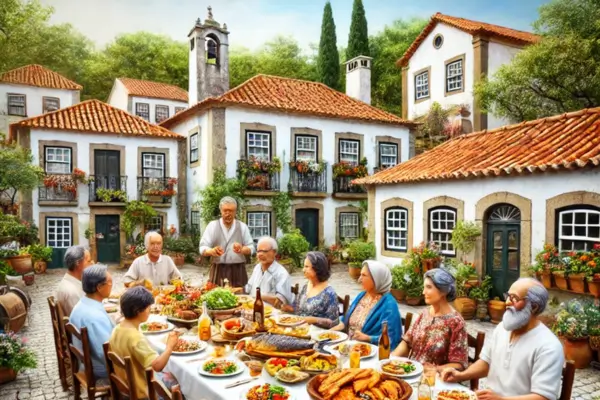Portugal has become a dream destination for expat families, offering a blend of sunny weather, affordable housing, and a relaxed lifestyle that’s hard to resist. With picturesque towns and a warm sense of community, it’s no wonder families are drawn to this corner of Europe in search of a fresh start and a better quality of life.
But settling into a new country is more than just finding a cheaper home or enrolling your kids in school—it’s about understanding the rhythms of daily life and blending into the local culture. From the way neighbors interact to the traditions that shape every season, Portuguese customs play a big role in helping expat families feel truly at home.
In this guide, we’ll explore five essential cultural customs that every expat family should know before making the move. These insights aren’t just about fitting in—they’re about creating a life in Portugal that feels rooted, connected, and uniquely yours.
The Central Role of Family in Portuguese Society
In Portugal, family isn’t just a part of life—it’s the heart of it. The Portuguese deeply value family bonds, and this strong sense of connection is woven into almost every aspect of their culture. For expat families, understanding and embracing this focus on family can open doors to meaningful friendships and a richer experience in your new home.
Why Family Matters in Portuguese Culture
Portuguese society revolves around the idea that family comes first. From grandparents to second cousins, relationships are nurtured across generations, creating tight-knit support systems. This sense of togetherness is not just sentimental; it’s practical, with extended families often playing active roles in childcare, celebrations, and even daily decision-making. As an expat, recognizing and respecting this familial closeness can help you better understand your Portuguese neighbors and colleagues.
Traditional Family Practices to Know
- Sunday Family Lunch: One of the most cherished traditions in Portugal is the long, leisurely Sunday lunch. Families gather—often spanning three or four generations—to share a meal, catch up, and enjoy each other’s company. As an expat, being invited to a Sunday lunch is a sign of acceptance, so don’t hesitate to join in and bring a small gift like wine or dessert.
- Celebrating Milestones Together: Whether it’s a wedding, baptism, or a child’s birthday, family celebrations in Portugal are big, joyful affairs. These events often extend to close friends and neighbors, creating a welcoming atmosphere where even newcomers can feel at home.
- Respect for Elders: In Portuguese families, elders hold a special place of honor. Grandparents often live nearby—or even with—their children and grandchildren, offering wisdom and support. Showing respect to older generations can go a long way in building rapport with local families.
How Expat Families Can Connect
- Participate in Local Activities: Family-oriented events like school fairs, community festas, and sports matches are great opportunities to meet other families. These gatherings reflect Portugal’s warm, inclusive culture, making it easier for your family to feel part of the community.
- Build Relationships Through Schools: Schools often become the hub for family connections. Be open to chatting with other parents at drop-off or volunteering for school events—it’s an easy way to form friendships with local families who share similar stages of life.
- Adopt Portuguese Hospitality: Don’t be shy about inviting neighbors or other expat families for coffee or a meal. In Portugal, hospitality is deeply valued, and reciprocating invitations helps strengthen bonds.
By embracing the Portuguese focus on family and its traditions, you’ll not only gain a deeper appreciation for the culture but also create lasting relationships that make Portugal feel like home for your entire family.
Festivals and Celebrations: The Heart of Portuguese Community Life
In Portugal, festivals aren’t just events—they’re vibrant expressions of history, community, and joy. From nationwide celebrations like Carnival to small-town festas honoring local saints, these gatherings are a cornerstone of Portuguese culture. For expat families, participating in festivals is a wonderful way to bond as a family and immerse yourselves in the traditions that define your new home.
Key Festivals You Should Experience
- Carnival: Taking place in February or March, Carnival is a colorful and lively celebration filled with parades, music, and costumes. Towns like Torres Vedras and Loulé are famous for their extravagant festivities, while smaller villages host more modest but equally spirited events. For families, it’s a great chance to dress up, join the fun, and experience Portugal’s love for creative expression.
- São João in Porto (June): This midsummer festival is a must-see, especially if you’re in Porto. Locals flood the streets with plastic hammers, garlic flowers, and fireworks to celebrate Saint John. Bring your kids along for the revelry, but keep in mind that the festivities often go late into the night, so plan accordingly.
- Local Festas: Almost every town and village in Portugal has its own festa, often tied to a patron saint. These events include processions, traditional music, and plenty of food stalls serving regional delicacies. They offer a more intimate look at Portuguese culture and are fantastic for making connections with locals.
Why Festivals Matter for Families
Festivals are more than just entertainment—they’re a way for families to come together and celebrate their community. Portuguese festivals often center around themes of togetherness, gratitude, and local pride, creating an inviting atmosphere for all ages. For expat families, attending these events is an opportunity to share in the joy, connect with neighbors, and create lasting memories.
Practical Tips for Expat Families
- Plan Ahead: Research festival dates and locations, as some events require advance planning, like finding accommodation or purchasing tickets for popular parades.
- Get Involved: Don’t just watch—join in! Whether it’s dancing, trying local dishes, or helping with a community activity, participating actively will deepen your experience.
- Dress the Part: Many festivals have traditional clothing or themes, and locals will appreciate your enthusiasm if you join in. Kids, especially, will love wearing costumes for Carnival or holding lanterns during São João.
- Respect Local Customs: Festivals often have religious or historical significance. Be mindful of traditions like observing moments of silence during processions or treating altars with respect.
Portugal’s festivals are a gateway to its vibrant culture and warm community spirit. For your family, they can become cherished traditions of your own, helping you feel more connected to your new home with each celebration.
The Portuguese Pace of Life: Adapting to “Hora Portuguesa”
In Portugal, life moves at its own rhythm—an unhurried pace often referred to as hora portuguesa. This relaxed attitude toward time can feel like a refreshing change from the hustle of other cultures but might also require some adjustments, especially for expat families juggling school schedules, work, and family routines. Understanding this slower, more flexible lifestyle can help you embrace the Portuguese way of living without feeling overwhelmed.
The Relaxed Approach to Time and Schedules
In Portugal, punctuality is often a loose concept, especially for social events. If you’re invited for coffee or a gathering, don’t be surprised if people show up 15–30 minutes after the agreed time. Similarly, appointments and even business dealings may start later than scheduled. For expats, it’s important to be patient and adapt to this cultural norm without taking it personally—it’s less about disrespect and more about prioritizing relationships and enjoying the moment.
Daily Life Patterns to Know
- Late Dinners: Dinner in Portugal typically starts around 8 or 9 PM, later than in many other countries. While this might seem challenging for families with young children, it’s worth trying to adjust gradually. You could start by having a small snack or lanche (afternoon snack) to tide you over. Many restaurants are accommodating and may serve earlier if needed.
- Extended Lunch Breaks: Lunch is a cherished meal in Portugal, often lasting up to two hours, particularly in smaller towns. This midday pause reflects a deep appreciation for taking time to eat and connect with family or colleagues. While it may feel inconvenient at first, it can also be an opportunity to slow down and enjoy quality time.
- Siesta-Like Afternoons in Rural Areas: In smaller towns and villages, many businesses close during the afternoon (typically 1–3 PM). This might feel like a disruption, but it’s also a chance to relax or explore other aspects of the day, like taking a scenic walk or enjoying the quiet streets.
Balancing the Lifestyle With Family Demands
- Adjust Gradually: If the late meals and long breaks feel overwhelming, try shifting your family’s routine incrementally. For example, move bedtime later by 15 minutes each week until it aligns better with local norms.
- Embrace Flexibility: While some aspects of Portuguese life may seem unpredictable, this flexibility can also be freeing. Accepting a less rigid schedule might reduce stress for both parents and kids.
- Create Your Own Blend: You don’t have to follow the Portuguese schedule to the letter. Find a balance that works for your family—such as maintaining earlier bedtimes on school nights but enjoying late dinners out on weekends.
Portugal’s laid-back pace might take some getting used to, but it offers the chance to focus on what really matters: relationships, quality time, and a slower, more mindful way of life. By embracing hora portuguesa, your family can find a rhythm that feels both authentic and sustainable.
Food Culture: More Than Just Meals
In Portugal, food is far more than sustenance—it’s a celebration of life, family, and tradition. Meals are a time to connect, share stories, and savor the flavors of the country’s rich culinary heritage. For expat families, embracing Portuguese food culture can deepen your understanding of the local lifestyle while creating delicious opportunities for bonding.
The Importance of Communal Eating and Dining Etiquette
Mealtime in Portugal is a cherished communal activity. Families often gather around the table for long, leisurely meals, with conversations that flow as freely as the wine. Sharing food is seen as an act of care, and even casual meals emphasize togetherness.
When dining out or with locals, there are a few customs to keep in mind:
- Take Your Time: Meals aren’t rushed. Whether at a restaurant or a family table, expect to spend at least an hour—often longer—enjoying the food and company.
- Respect the Rituals: Bread, olives, and other small starters are usually placed on the table at the beginning of a meal. You’re not obligated to eat them, but they may be added to your bill if you do.
- Kids Are Welcome: Portuguese restaurants and homes are family-friendly, and children are often treated warmly, so don’t hesitate to bring them along.
Popular Family-Friendly Dishes
Portugal’s cuisine is hearty, flavorful, and full of variety, making it easy to find dishes that appeal to the whole family. Some highlights include:
- Bacalhau (Salt Cod): Known as the “faithful friend” of Portuguese cuisine, bacalhau is prepared in countless ways, from bacalhau à brás (with eggs and potatoes) to oven-baked casseroles. It’s a must-try and surprisingly versatile.
- Caldo Verde: This comforting soup made with kale, potatoes, and chouriço is perfect for cooler days and a hit with kids.
- Pastéis de Nata: These famous custard tarts are a universal favorite and a fun treat to enjoy together.
- Grilled Fish: Freshly grilled fish, like sardines or sea bass, is a staple along the coast. Served with simple sides, it’s a healthy, flavorful choice for family meals.
How Expat Families Can Explore Portuguese Gastronomy
- Visit Local Markets: Portuguese markets are brimming with fresh produce, seafood, and regional specialties. Involve your kids by letting them pick out ingredients for a home-cooked meal.
- Join the Community Table: Attend local food festivals or tasquinhas (small food stalls) to sample traditional dishes and meet other families. These events often feature live music and a festive atmosphere.
- Try Cooking Portuguese Dishes: Learning to cook Portuguese recipes at home is a great way to immerse your family in the culture. Dishes like arroz de pato (duck rice) or frango piri-piri (spicy chicken) are fun to prepare and share.
- Make Meals a Family Event: Adopt the Portuguese approach by treating meals as more than eating—make them occasions for connection. Set aside time for family dinners where everyone can relax and enjoy the moment.
By embracing Portuguese food culture, your family can discover not just a love for local flavors but also a deeper connection to the people and traditions that make Portugal feel like home. Bon appétit—or, as the Portuguese say, bom apetite!
Raising Children in Portugal: Education, Community, and Values
Portugal is a wonderful place to raise children, offering a blend of quality education, a strong sense of community, and cultural values that emphasize respect, kindness, and family bonds. As an expat, understanding these aspects can help your children adapt and thrive in their new environment.
Overview of the Education System and Extracurricular Activities
Portugal’s education system is well-structured and caters to a variety of needs, making it accessible for expat families.
The Emphasis on Community Involvement and Respect for Elders
Portuguese culture is deeply rooted in values that prioritize community and respect. These principles are often reflected in how children are raised and educated.
- Community Engagement: Portuguese children are encouraged to participate in communal activities, whether it’s through school events, local festas, or neighborhood gatherings. This fosters a sense of belonging and teaches the importance of contributing to the community.
- Respect for Elders: A cornerstone of Portuguese values is treating elders with respect and reverence. Children are taught to greet and acknowledge older people with politeness, often using formal language. Expats can reinforce this by encouraging similar manners at home, helping their kids blend seamlessly into the local culture.
Tips for Helping Expat Children Adapt to Life in Portugal
- Language Immersion: Enroll your children in Portuguese classes or consider a bilingual school to help them learn the language. Younger kids, in particular, tend to adapt quickly and often become fluent faster than their parents.
- Foster Friendships: Encourage your kids to participate in school activities or sports, which are great ways to meet peers and build friendships. Joining local clubs or playgroups can also help them feel included.
- Celebrate Traditions Together: Embrace Portuguese holidays, foods, and traditions as a family. Celebrating local customs can make your children feel more connected to their new home.
- Maintain Familiarity: While it’s important to adapt, keeping some routines or activities from your home country—like a favorite bedtime story or holiday tradition—can provide comfort during the transition.
- Stay Involved: Engage with your child’s school and local community. Joining parent-teacher associations or volunteering at school events shows your commitment to integrating and helps build relationships.
Raising children in Portugal is an enriching experience that combines the benefits of a safe, welcoming environment with cultural values that nurture respect and connection. With time and effort, your family can build a fulfilling life while preserving your unique identity as expats.
Building Bridges Through Cultural Understanding
Embracing Portuguese customs is more than just learning about a new culture—it’s about building bridges between your family and the community around you. From the warmth of shared meals to the joy of local festivals, Portugal offers countless opportunities to create meaningful connections and make your life as an expat family truly enriching.
Approaching cultural differences with curiosity and openness is key to a smooth transition. Rather than seeing these differences as obstacles, treat them as invitations to learn and grow. Whether it’s adopting the laid-back rhythm of hora portuguesa or participating in a village festa, every interaction is a chance to deepen your family’s understanding of what makes Portugal unique.
To foster a genuine connection with your new community, take small but consistent steps. Learn a few phrases in Portuguese, participate in neighborhood activities, and celebrate local traditions alongside your own. Over time, these efforts will not only help your family feel more at home but also build lasting relationships that make your expat journey in Portugal truly unforgettable.




